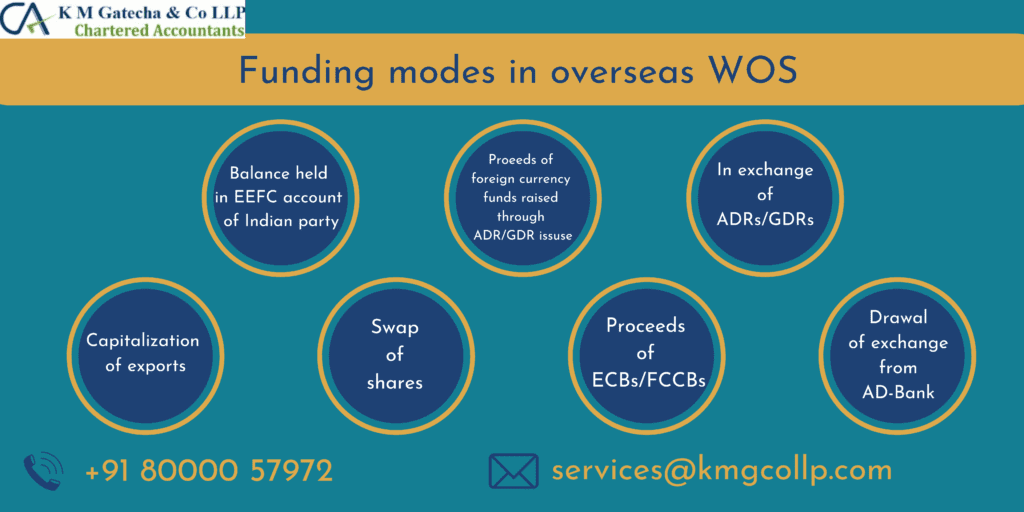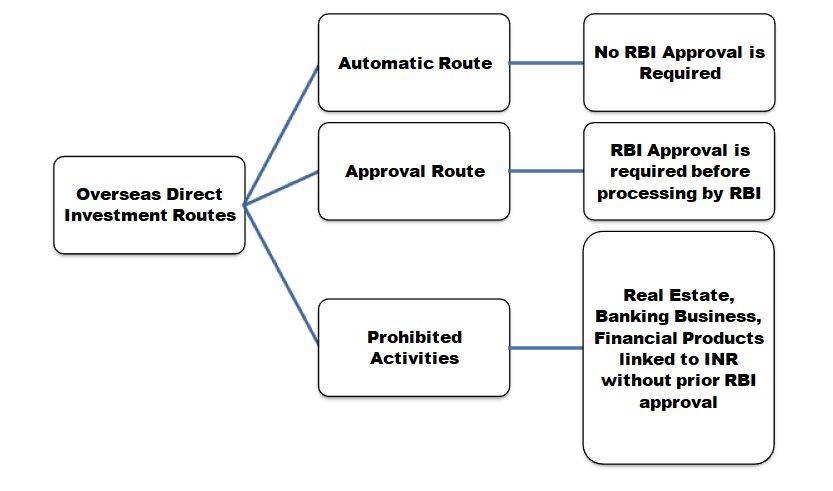Overseas Direct Investment Services
Call Us Today +91 80000 57972
Indian companies can invest in entities abroad by contributing to their equity shares, giving them a loan or offering a guarantee. These equity shares can be obtained through market purchase, private placement or through a stock exchange. Portfolio investment is not included in this definition. The Indian Party has the option to invest in a foreign entity either by purchasing equity shares, providing a loan, or offering a guarantee, with the total of these three investments not exceeding 400% of the Indian Party's net worth. Any Indian Party that chooses to make an overseas direct investment must approach a designated Authorised Dealer to facilitate the transfer of funds.
Overseas Direct Investment Services in Ahmedabad, India
The remittance request must be submitted along with a completed Form ODI Part I. Additionally, the documents such as Form A-2, a Board of Directors resolution, an Auditor’s Certificate, the Certificate of Incorporation, the Memorandum and Articles of Association, a copy of the PAN card of the Indian Entity, the Certificate of Incorporation, and the bye-laws of the overseas entity must be included.
After the Authorised Dealer Bank has gone through and accepted the documents as per the regulatory guidelines, the remittance/ investment will be made and the documents forwarded to the Reserve Bank of India. Once the funds have been sent, the RBI will issue a Unique Identification Number (UIN) linked to the Joint Venture Company/ Wholly Owned Subsidiary (JV/ WOS). This UIN will be used for any further investments/ remittances in the JV/ WOS.

The following shall be considered as Indian Party for the purpose of making investment under the ODI Guidelines-
- A Company registered in India
- A Body created under an Act of Parliament
- A Partnership Firm registered under the Limited Liability Partnership Act,1932

Limits for Overseas investment
– There is a limit on the financial commitments. The term Financial Commitments includes the following-
- The Indian Party has invested directly through equity and loan.
- The Indian Party has pledged to guarantee 100% of the amount for its overseas joint venture or wholly-owned subsidiary.
- The Indian Party has committed to guaranteeing 50% of the performance of its overseas joint venture or wholly-owned subsidiary.
The amount of money the Indian Party is willing to commit financially cannot exceed 400% of their current net worth (according to the latest audited balance sheet) and must be no more than USD 1 billion each year.

Establishing the Joint Venture (JV) and Wholly Owned Subsidiary (WOS)
A Joint Venture (JV) is a foreign business entity that is legally established in accordance to the laws of the country it is based in, with an Indian investor and either another Indian or foreign partner sharing the investment.
A Wholly Own Subsidiary Company (WOS) is a foreign firm created, registered, or established in line with the laws of the country in which it is located, and its entire share capital is held by an Indian party – there are no other owners of the WOS’s share capital.
Check out the best DIN Surrender Services
Recent Posts
- Step-by-Step Process to Claim GST Refunds Efficiently
- Benefits of Regular Audits for Limited Liability Partnerships
- APEDA Registration Consultants in Ahmedabad: Expert Guidance for Exporters
- MIS Reporting Consultants in Ahmedabad: Expert Financial Insights for Business Growth
- NGO Registration Consultants in Ahmedabad: Expert Guidance for Trust, Society & Section 8 Company Formation
- Top Startup Consultants in Ahmedabad: Expert Guidance for Business Launch & Growth
- Startup Advisory Services in Ahmedabad: Complete Business Support for Startups & Founders
- One Person Company (OPC) Registration in Ahmedabad: Step-by-Step Guide, Fees & Legal Requirements
- Top 10 Reasons You Need a Chartered Accountant for Company Compliance in India
- Why Hiring a Chartered Accountant (CA) for Company Compliance is Critical: A Complete Guide for Indian Businesses
FAQs on Overseas Direct Investment Services
An example of this is Amazon’s establishment of a new headquarters in Vancouver, Canada. Additionally, reinvesting profits from overseas operations and loaning money to foreign subsidiaries are both seen as foreign direct investments.
Investment by a resident Indian in a company that is listed on an exchange, even after the company has been delisted, will still be classified as Overseas Direct Investment until another investment is made.
(i) Any individual living in India who has an account that is classified as a non-performing asset.
(ii) if they are classified as a deliberate non-payer of debt by any bank.
(iii) The Central Bureau of Investigation and Directorate are investigating a financial services regulator in India.
Overseas Portfolio Investment (OPI) is any form of investment that is not categorized as Overseas Direct Investment (ODI), with some exceptions. An instance of OPI would be when a resident Indian purchases shares of a publicly listed foreign company without having more than 10% ownership or control, such as stocks of Amazon or Tesla.
